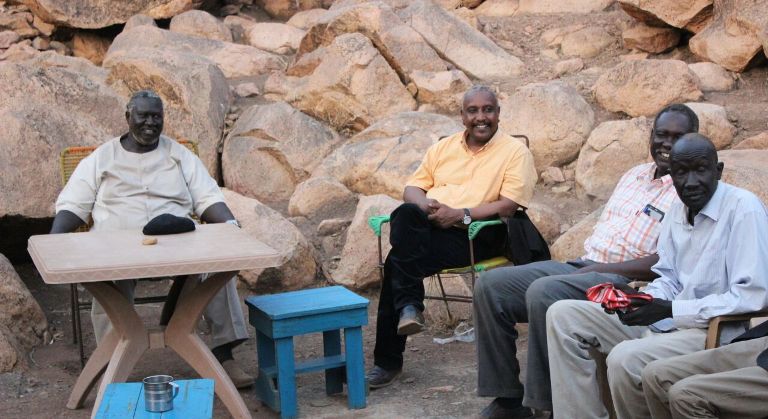Agar, Arman release papers on ways to rebuild SPLM-N

October 22, 2017 (KHARTOUM) – SPLM-North chairman Malik Agar and secretary-general Yasir Arman released two detailed papers reflecting a joint position towards the rebuilding of the Movement and the renewal of its New Sudan’s vision.
Agar titled his paper “Splits in Sudan’s Liberation Movements and Questions of the Future: Different Personalities Same DNA” while Arman libelled his text “Towards a Second Birth of the New Sudan Vision – Issues of National Liberation in Today’s World”. The second one is only in Arabic for the time being, as Agar’s one is available in Arabic and English.
The two papers come out after a rift in the group that began last March with the resignation of the SPLM-N deputy chairman Abdel Aziz al-Hilu who accused his comrades Agar and Arman of refusing to back his demand for the Nuba Mountains self-determination.
Recently al-Hilu with the support of the Nuba Mountains Liberation Council and the group’s military held an extraordinary general conference earlier this month. Agar and Arman plan to organise another general conference next January.
The documents which are released after a retreat they organised with their group leading figures this month come within the framework of ongoing preparation for the general conference next January.
The two texts are based on a close look at the changes that took place in the Sudanese political arena after the secession of South Sudan. They considered these variables as a fundamental reason for the renewal of the New Sudan’s vision to cope with the reality which affects in one way or another the success of applying the vision on the ground.
In their analysis, the two papers sought to criticize the “New Sudan” project, while preserving its basic principles and ideas, instead of adhering to the sanctity of the vision and its rigidity without taking into account the changes that occurred since its inception.
Arman said that the vision of the New Sudan has been able to prove its validity since three decades and more, adding that it is “a vision that does not die,”(…) “despite experiencing several bad turns and bitter tests it came out clearer to the ordinary citizen and closer to the issues of the masses.”
On the other side, Agar’s paper included the SPLM-N “goals and vision”, the issue of identity and religion, the armed struggle, negotiations and peaceful talks, political alliances and decision-making.
The texts agree on the axis of “political alliances.”
“There is no political party or movement that can continue and flourish and it works alone without the other parties and organizations,” Agar said.
He pointed out that ” Historically the SPLM-N has been working with various forces and parties, some of which adopt an ideology on the opposite side of the SPLM vision, thought and goals.
“Political coalitions and alliances (…) allow political organizations to grow and test their development,” he said.
“The main lesson we learned from the recent crisis – of the internal coup and spilt of the SPLM-North – is that there must be more pragmatic, democratic and constructive efforts through an open debate, in which the right questions are raised in order to prepare better for the future.”
In his paper, Arman proposed to establish a historic bloc of all those who wish to build the New Sudan, adding that “the people still have the ability to accomplish the tasks of strategic change, to return to the platform of genesis and revisit the past experience and vision and provide fresh air for the purpose of renewal and absorption of developments”.
He stressed that use of the knowledge gained from experience requires reviewing the latter with a critical mind. Furthermore, he pointed to the Movement’s need for openness towards strategic allies, adding that their experiences and visions should be taken into consideration and used in the process of renewal.
On the peace process, Arman who was the chief negotiator of the unified SPLM-N that during the “15” round of negotiations with the government over the past six years, the Movement linked the end of the war to a comprehensive peace agreement leading to an inclusive democratic transition and rejected any process that leads to placing it on the margin of the current regime.
“This is the essence of the conflict between the Khartoum regime and the Movement, which has emphasised on the need to link between the issues of the Two Areas, a change in the centre of power, and a comprehensive agreement leading to a democratic transition, while the regime has wanted to restrict the process to the Two Area, and even to discuss separately each area, “he said.
He further said the SPLM-N was under considerable pressure from the international community against its position.
” It is no surprise, therefore that the coup against the leadership of the Movement has become the source of happiness and joy for Khartoum because it will eventually reduce it.”
SELF DETERMINATION
Arman pointed to the call for self-determination by al-Hilu saying “it has confused the strategic political line of the Movement and led those who proposed it to a negotiation impasse”.
“Because we know the seriousness of such a demand, we have proposed many times to gather the political, military and civilian leadership to resolve it and take a democratic decision to maintain the unity of the Movement,” he added.
Mentioning the fighting in the Blue Nile state between the partisans of Malik Agar and al-Hilu, Arman said these clashes are the first direct result of the call for self-determination that divided the SPLM-N, would divide the people of the Two Areas and give a free victory to the government in Khartoum.
“So sticking to the New Sudan vision, alone, is one of the conditions for the SPLM to remain united,” he said.
(ST)
*Agar’s paper is integrally published on the opinion section
